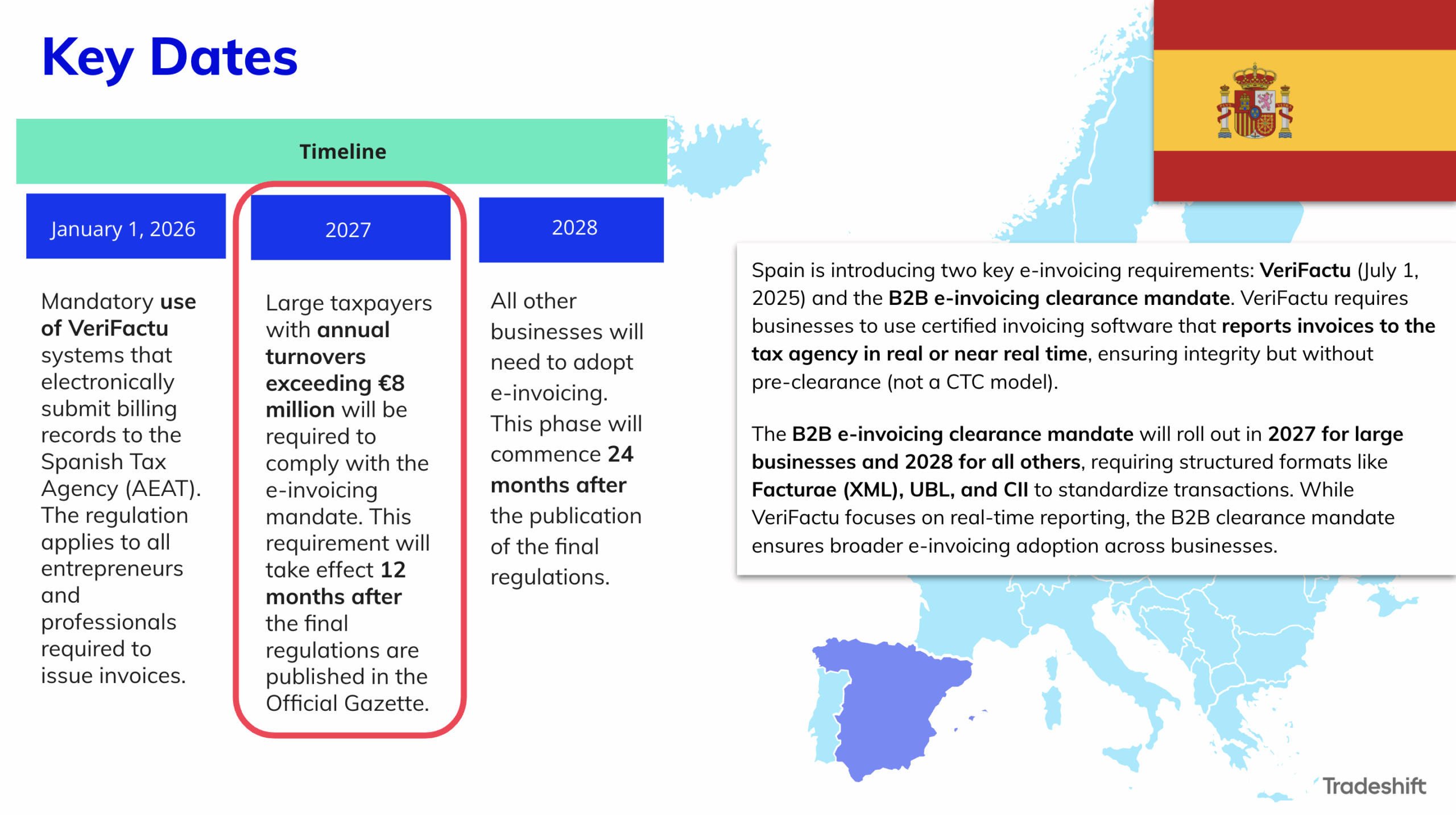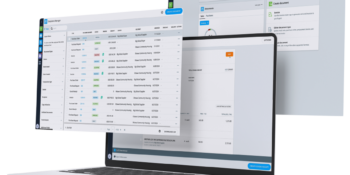Spain’s E-Invoicing Mandate Explained: Key Dates, Requirements, and How to Prepare

By Ioana Ploesteanu
Senior Product Marketing Manager
Tradeshift
About the Author
As part of the Product team, Ioana Ploesteanu partners with marketing and engineering to craft the positioning and lead user engagement strategies for e-Invoicing compliance and AI-driven capabilities.
What finance, tax and IT leaders need to know about Spain’s shift to mandatory e-Invoicing
Spain is on the path to mandating B2B e-Invoicing to align with the VAT in the Digital Age (ViDA) initiative, as well as with other European countries that have already implemented, or are in the process of implementing, e-Invoicing systems, such as France, Germany, Romania and Belgium.
These changes, which include mandatory electronic invoicing (e-invoicing) for B2B transactions, are designed to improve tax compliance, minimize fraud, and drive digitalization. The journey toward full implementation has encountered delays, leading to revised timelines that businesses must navigate in the following years.
👉 Download our whitepaper and overcome the complexities of global e-invoicing mandates.
What are the key dates of the B2B e-invoicing mandate in Spain?
The Spanish government’s initial plan aimed for a phased implementation of the B2B e-invoicing mandate, starting as early as July 2025. Due to complexities in finalizing the necessary technical specifications, this timeline has been adjusted and only the mandatory use of VeriFactu is set to be in effect as of January 1st 2026.
Timeline for implementation
- January 1st 2026: Mandatory use of VeriFactu systems that electronically submit billing records to the Spanish Tax Agency (AEAT). The regulation applies to all entrepreneurs and professionals required to issue invoices. VeriFactu requires businesses to use certified invoicing software that reports invoices to the tax agency in real or near real time, ensuring integrity but without pre-clearance (not a CTC model).
- 2027: Large taxpayers with annual turnovers exceeding €8 million will be required to comply with the e-invoicing mandate. This requirement will take effect 12 months after the final regulations are published in the Official Gazette.
- 2028: All other businesses will need to adopt e-invoicing. This phase will commence 24 months after the publication of the final regulations.

What are the key requirements for Spanish businesses to be e-Invoicing compliant?
The B2B e-invoicing clearance mandate in Spain will roll out in 2027 for large businesses and 2028 for all others, requiring structured formats like Facturae (XML), UBL, and CII to standardize transactions. While VeriFactu focuses on real-time reporting, the B2B clearance mandate ensures broader e-invoicing adoption across businesses.
B2B compliant e-Invoices must contain:
- The exact date and time of creation
- The invoice number
- Either the hash or footprint of the previous invoice record
- The identification code of the invoicing software
- A QR code that contains a graphic representation of the invoice’s content
The mandate will impact a broad spectrum of businesses operating in Spain:
- Large Enterprises: Companies with annual turnovers exceeding €8 million will need to comply with the B2B e-invoicing mandate starting in 2027.
- Small and Medium-sized Enterprises (SMEs): SMEs are expected to comply with the VeriFactu requirements by January 1, 2026, and the B2B e-invoicing mandate by 2028.
- Self-Employed Individuals: Those subject to Income Tax will also be required to adhere to these mandates within the specified timelines.
- Exemptions: Businesses already complying with Spain’s real-time reporting system (SII) and those exempt from invoicing obligations are not required to adopt VeriFactu.
How should businesses prepare?
To ensure a smooth transition to mandatory e-invoicing, businesses should consider the following steps:
- Assess current systems: Evaluate existing invoicing and accounting systems to determine their readiness for e-invoicing integration.
- Select compliant software: Choose e- invoicing solutions that support approved formats such as Facturae (XML), UBL, and CII, and are compatible with the Spanish Tax Authority’s (AEAT) systems.
- Train staff: Provide training for employees to familiarize them with new e-invoicing processes and compliance requirements.
- Monitor regulatory updates: Stay informed about any changes or updates to the e-invoicing mandate to ensure ongoing compliance. Check out our blog and Global Compliance Map to stay up to date with B2B e-invoicing compliance requirements.
- Engage with Experts: Consult with tax and IT professionals to navigate the complexities of implementation effectively.
✨ To learn more about the latest e-Invoicing compliance changes, check out our Spring Release blog post.
How can Tradeshift help with e-Invoicing compliance in Spain?
Tradeshift’s compliance-as-a-service and AI-powered AP automation solutions support digital transformation while ensuring adherence to e-Invoicing and tax clearance mandates. Our track record includes successful implementations for major clients such as AirFrance, Disneyland Paris, DHL, and Schaeffler.
We currently offer compliance-as-a-service in 70 countries, streamlining tax clearance in 12 and e-Invoicing in others, and our platform is localized in 26 languages. Our support extends to countries with B2B e-Invoicing or tax clearance mandates, including France, Germany, Spain, Belgium, and Australia, with plans to expand into other European and APAC countries. We continuously monitor global regulations to update our roadmap and maintain compliance excellence.
Among our compliance strengths, we are a certified Peppol Access Point provider, we offer unique cross-zone fapiao e-Invoicing in China, and we were also among the first registered PDPs (PDP immatriculée) in France.
Penalties for non-compliance are increasing. Is your business compliant?
You may also be interested in
Spring 2025 product release: e-Invoicing compliance and AI
The Spring 2025 Tradeshift product release is here, introducing new e-invoicing compliance features and AI-powered capabilities that benefit both AP and AR teams. In this article, we’ll highlight some key updates.
France PDP e-Invoicing mandate: PDP Calendar February 2025 update
We’ve now entered the third year of France’s PDP clearance mandate rollout plan. With the deadline fast approaching, businesses must keep pace with evolving requirements to maintain smooth and hassle-free compliance. This article provides a comprehensive update on the latest developments in France’s e-Invoicing clearance mandate and highlights the key milestones for the 2025 PDP calendar.
ViDA Update March 2025: The EU adopts ViDA (VAT in the Digital Age)
The ViDA rules and its three pillars will digitize VAT reporting obligations for companies trading across EU borders by 2030, mandate online platforms to pay VAT on short-term rentals and passenger transport services in most cases where individual providers don’t charge VAT, and enhance online VAT one-stop-shops to simplify VAT registration for businesses operating in multiple member states.
Belgium’s e-Invoicing mandate: Are you compliance ready?
Belgian businesses are about to experience a significant change in invoicing practices. Following a growing European trend towards digital tax reporting (notably the adoption of the ViDA framework), a mandatory e-invoicing compliance regulation will be implemented in 2026 via the Peppol network. This initiative aims to modernize invoicing, improve tax compliance, and reduce fraudulent activity.



